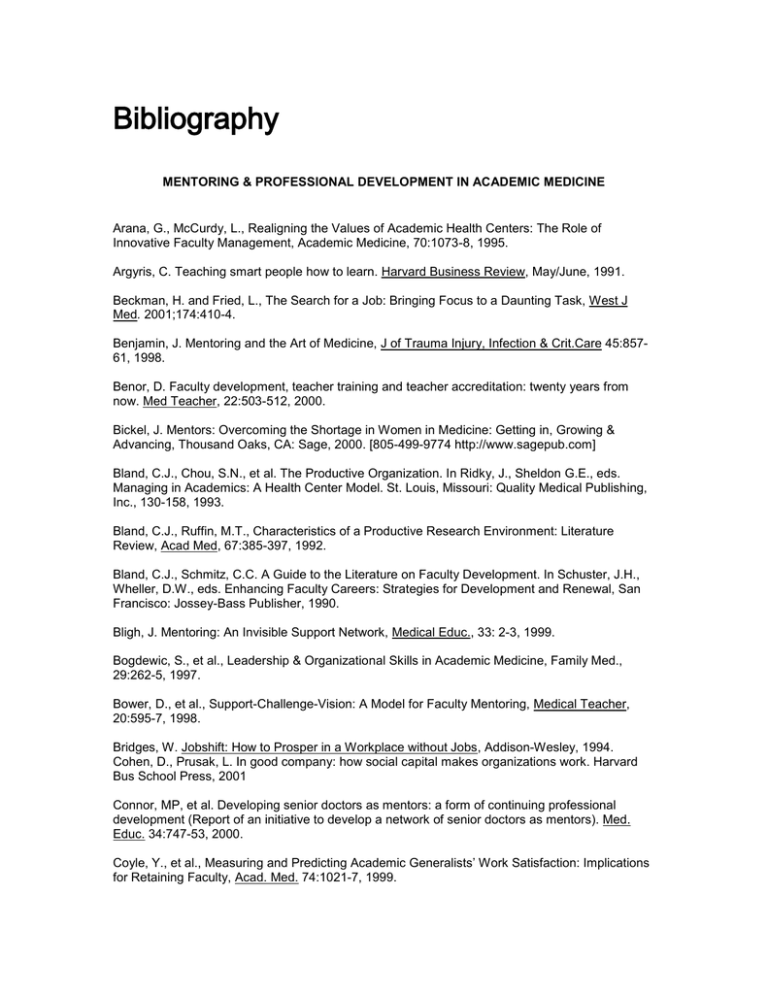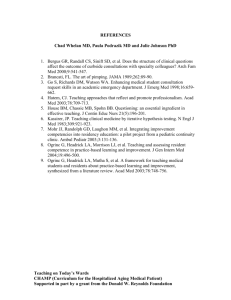Bibliography
advertisement

Bibliography MENTORING & PROFESSIONAL DEVELOPMENT IN ACADEMIC MEDICINE Arana, G., McCurdy, L., Realigning the Values of Academic Health Centers: The Role of Innovative Faculty Management, Academic Medicine, 70:1073-8, 1995. Argyris, C. Teaching smart people how to learn. Harvard Business Review, May/June, 1991. Beckman, H. and Fried, L., The Search for a Job: Bringing Focus to a Daunting Task, West J Med. 2001;174:410-4. Benjamin, J. Mentoring and the Art of Medicine, J of Trauma Injury, Infection & Crit.Care 45:85761, 1998. Benor, D. Faculty development, teacher training and teacher accreditation: twenty years from now. Med Teacher, 22:503-512, 2000. Bickel, J. Mentors: Overcoming the Shortage in Women in Medicine: Getting in, Growing & Advancing, Thousand Oaks, CA: Sage, 2000. [805-499-9774 http://www.sagepub.com] Bland, C.J., Chou, S.N., et al. The Productive Organization. In Ridky, J., Sheldon G.E., eds. Managing in Academics: A Health Center Model. St. Louis, Missouri: Quality Medical Publishing, Inc., 130-158, 1993. Bland, C.J., Ruffin, M.T., Characteristics of a Productive Research Environment: Literature Review, Acad Med, 67:385-397, 1992. Bland, C.J., Schmitz, C.C. A Guide to the Literature on Faculty Development. In Schuster, J.H., Wheller, D.W., eds. Enhancing Faculty Careers: Strategies for Development and Renewal, San Francisco: Jossey-Bass Publisher, 1990. Bligh, J. Mentoring: An Invisible Support Network, Medical Educ., 33: 2-3, 1999. Bogdewic, S., et al., Leadership & Organizational Skills in Academic Medicine, Family Med., 29:262-5, 1997. Bower, D., et al., Support-Challenge-Vision: A Model for Faculty Mentoring, Medical Teacher, 20:595-7, 1998. Bridges, W. Jobshift: How to Prosper in a Workplace without Jobs, Addison-Wesley, 1994. Cohen, D., Prusak, L. In good company: how social capital makes organizations work. Harvard Bus School Press, 2001 Connor, MP, et al. Developing senior doctors as mentors: a form of continuing professional development (Report of an initiative to develop a network of senior doctors as mentors). Med. Educ. 34:747-53, 2000. Coyle, Y., et al., Measuring and Predicting Academic Generalists’ Work Satisfaction: Implications for Retaining Faculty, Acad. Med. 74:1021-7, 1999. Dalox, L.A., Effective Teaching and Mentoring, Jossey-Bass, 1986. Evans, C. Faculty Development in a Changing Academic Environment. Acad. Med., 70:14-20, 1995. Etzkowitz, H. Athena unbound: the advancement of women in science and technology, Cambridge UK: Cambridge U Press, 2000. Fletcher, J., Disappearing Acts: gender, power and relational practices at work. MIT Press, 2000. Fried, L., et al., Career Development for Women in Academic Medicine: Multiple Interventions in a Department of Medicine, Journal of American Medical Association, 276:898-905, 1996. Gjerberg, E. and L. Kjolsrod, The doctor-nurse relationship: how easy is it to be a female doctor co-operating with a female nurse? Soc Sci & Med 52:189-202, 2001. Grady-Weliky, T., Kettyle, C., Hundert, E. New light on needs in the mentor-mentee relationship. In Educating for Professionalism: Creating a Cultural of Humanism in Medical Education, edited by D. Wear and J. Bickel. Iowa City: U. of Iowa Press, 2000. Guthrie, M. Challenges in Developing Physician Leadership & Management, Frontiers of Health Services Management 15 4:3-26. 1999. Heath, D. Fulfilling Lives-Paths for Maturity and Success, San Francisco: Jossey Bass, 1991. Hirsch, G., Strategic Career Management for the 21st Century Physician. Chicago: American Medical Association, 2000. Hitchcock, M.A., Bland, C.J. et al., Professional Networks: The Influence of Colleagues on the Academic Success of Faculty, Acad. Med., 70:1108-16, 1995. Kaplan, S. H., et al., Sex Differences in Academic Advancement: Results of a National Study of Pediatricians, New England Journal of Medicine, 335:1282-1289, 1996. Kennedy, M.M., Someone Promised Mentors: Will You Deliver? The Physician Executive, March/April, 2001. Limacher, M. et al. The ACC Professional Life Survey: Career Decisions of Women and Men in Cardiology. J. Am. Coll. Cardiology 32:827-35, 1998. Linney, B.J., Characteristics of Good Mentors, The Physician Executive, May/June, 1999. Mark, S. et al. Innovative mentoring programs to promote gender equity in academic medicine. Acad. Med. 76:39-42, 2001. Morzinski, J.A., et al. Faculty Development Through Formal Mentoring. Acad. Med. 69:267-9, 1994. Morzinski, J.A., Fisher, J.C., An Evaluation of Formal Mentoring Studies and a Model for their Improvement. Evaluation Practice, 17:43-56, 1996. Morzinski, J.A., et al. A Descriptive, Cross-Sectional Study of Formal Mentoring for Faculty. Family Medicine, 20:595-597, 1998 Murrell, A., Crosby, F., Ely, R. Mentoring Dilemmas: Developmental Relationships within Multicultural Organizations, Mahwah NJ: Lawrence Erlbaum Pub, 1999. Neumayer, L. et al. Mentors for Women in Surgery and their Effect on Career Advancement. Current Surgery 52:163-166, 1995. Osborn, T.M., et al. Mentorship: Through the Looking Glass into our Future. Ann. Emerg. Med., 34:285-9, 1999. Patch, K. Future-vision: Innovations in corporate career centers. Career Planning & Adult Devel J. 16:97-103, 2000 (summer). Ragins, B. and Cotton, J. Gender and Willingness to Mentor in Organizations, J. of Management,19:97-111, 1993. Reardon, K. The Secret Handshake: Mastering the Politics of the Business Inner Circle, Doubleday, 2001. Reina, D. Trust & Betrayal in the Workplace: building effective relationships in your organization, Barrett-Koehler Pub, 1999. Roth, L.M., The Champions Project: A Two-tiered Mentoring Approach to Faculty Development, Acad Med, 75:553-554, 2000. Saha, S., et al., A survival guide for generalist physicians in academic fellowships, JGIM, 14:7459, 1999. Senge, P. et al., The Dance of Change: The Challenges to Sustaining Momentum in Learning Organizations, NY: Doubleday, 1998. Stone, D, et al.Difficult Conversations: How to Discuss what Matters Most , Penguin, 1999. Thomas, D.A., The Truth About Mentoring Minorities: Race Matters, Harvard Business Review, 79:99-107, 2001. Vaill, P. Learning as a Way of Being: Strategies for Survival in a World of Permanent White Water by Peter Vaill, San Francisco: Jossey Bass Inc., 1996. Valian, V. Why So Slow: The Advancement of Women, Cambridge MA: MIT Press, 1998. Wilkerson, L., Irby, D. Strategies for Improving Teaching Practices: A Comprehensive Approach to Faculty Development, Acad. Med. , 73:387-96, 1998. Woessner, R., et al., Support and Faculty Mentoring Programmers for Medical Students in Germany, Switzerland and Austria. Med Educ, 34:480-482, 2000. (compiled by Janet Bickel, AAMC, 10/01)
